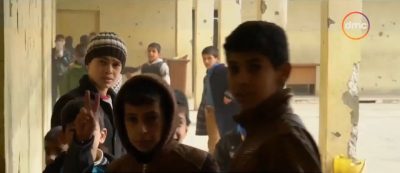Schools of Mosul: Dilapidated Buildings, Traumatised Students
Across Mosul schools are reopening. But many are damaged and short on supplies while students themselves remain traumatised.

Dilapidated buildings, broken walls, smashed windows and destroyed doors. These are the legacy of the battles that have been waged across Iraq and, in particular, Mosul. With the immediate ISIS threat in the country at an end, many Iraqis are looking to the challenges of reconstruction that lie ahead.
The Iraqiya School in the Bab al-Jadida district of Mosul is one of the 638 schools in the city that have reopened since the city was liberated from ISIS militants. However, like much of the city, the school itself bears the scares of war. Many of the walls remain riddled with bullet holes, all windows have been broken and three classrooms have been destroyed, with debris covering much of the school grounds.
Furthermore, the school has no electricity and no health facilities. The school authorities here have attempted to alleviate some of these troubles. But they have limited resources and many of their solutions, such as putting plastic sheeting on the windows, are stop-gap solutions. The numbers speak for themselves: the school, once able to accommodate 700 students, can now only take 218.
The scars left in the wake of war are not just physical. Many of the children here are suffering psychologically as well. Many of them have witnessed ISIS atrocities, experienced siege conditions, displacement and were possibly caught in the crossfire of the militants and the Iraqi Security Forces. The teachers here say that a handful of students, in particular, are in a particularly bad state, suffering from fits and shakes at the smallest event. Although the teachers here do their best to help, many of them simply don’t have the training or the resources to take care of them all, and optimism is wearing thin.
Across Iraq, a number of education-centric reconstruction programmes are slowly rebuilding schools. Meanwhile, teachers in Mosul are being offered workshops to help deal with traumatised students. However, the spread of these programmes is uneven. With some three million children across Iraq having missed out on education, the challenges are nothing short of enormous.

